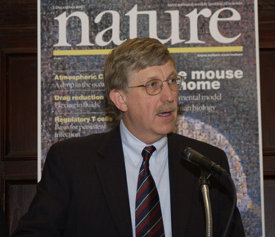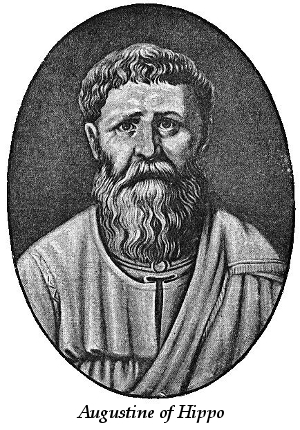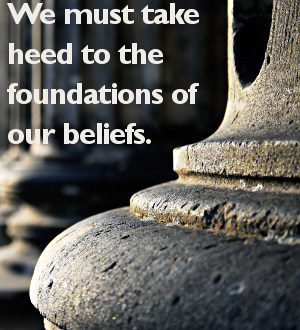A New Way to "Do Theology"
Body
Discussion
Francis Collins - No Friend of Bible Believers
 Francis Collins, the former Director of the Human Genome Project (HGP) and now the Director of the National Institutes of Health (NIH), has risen to national prominence in recent years. His scientific acumen combined with his rather public confession of Christian faith has garnered both excitement by Christians, as seen in these Christianity Today articles (here and here), and interest among unbelievers, as in this exchange with Richard Dawkins in Time.
Francis Collins, the former Director of the Human Genome Project (HGP) and now the Director of the National Institutes of Health (NIH), has risen to national prominence in recent years. His scientific acumen combined with his rather public confession of Christian faith has garnered both excitement by Christians, as seen in these Christianity Today articles (here and here), and interest among unbelievers, as in this exchange with Richard Dawkins in Time.
But not everyone is excited about Collins’ recent appointment by President Obama to direct NIH. Sam Harris, the author of the atheistic diatribes against faith, The End of Faith and Letter to a Christian Nation, questions Collins’ fitness for NIH due to the geneticist’s Christian faith in this NY Times piece. While I don’t question Collins’ fitness for his present position, I do question how much he should be viewed as an ally of Bible-believing Christians. His foreword in a new book exposes his disdain for anyone who would take the creation account in Genesis 1-2 as an accurate description of the beginning of the world. Collins pens a four-page foreword for Karl Giberson’s Saving Darwin: How to Be a Christian and Believe in Evolution (Harper One, 2008). In this rather strained attempt to harmonize Christianity and Darwinism, Giberson stretches the limits of reason and logic in an attempt to reconcile the irreconcilable. His book is introduced by Collins’ similarly tortured attempt to elevate science way beyond its boundaries and to denigrate anyone who supports Intelligent Design (ID), young-earth creationism or virtually anything regarding the early chapters of Genesis.
Collins describes ID’s challenge to evolution’s ability to explain irreducibly complex structures in living organisms as pressing on “despite the lack of any meaningful support in the scientific community” (p. v). This statement is simply not true and masks not only the many scientists who question Darwinism’s explanation of irreducible complexity but also the almost universal pressure on scientists to toe the party line concerning Darwinism.
Discussion
An Ancient Tool for Distinguishing Churches

As a pastor, I am occasionally asked to explain the difference between two denominations, synods, religious organizations, or the like.
Discussion
A Plea for Theological Literacy
 Reprinted with permission from Dan Miller’s book Spiritual Reflections. The text appears here verbatim.
Reprinted with permission from Dan Miller’s book Spiritual Reflections. The text appears here verbatim.I was born in Minnesota, and this great state has been my home for many years now. But I was raised near Philadelphia, Pennsylvania, and I am not slow to acknowledge that growing up in one of the most history-rich regions in America has deeply influenced me.
An exceptional Junior High history teacher was pivotal in the nurture of my affections for history. But my interest was also fueled by repeated visits to the very sites I read about in the history books. These places were more to me than abstract concepts found in dry books. They were locations where I played and picnicked and listened on warm summer days to guides retell the fascinating stories of important people and key events from our nation’s past.
My family picnicked routinely on the banks of the Delaware River near where George Washington crossed to defeat the Hessians on that memorable Christmas night in 1776. I spent more than one summer afternoon running across the rolling fields of Valley Forge where General Washington’s troops lodged in crude log huts during the long winters of 1777-1778. I have toured Washington’s headquarters at Valley Forge, Pennsylvania, and his home at Mount Vernon, Virginia. I have visited our nation’s capital, looked often through the crack in the Liberty Bell, and sensed the ghosts of Franklin and Jefferson as I stood in the room where the Declaration of Independence was signed. I have visited the Old North Church, Betsy Ross’ house, and stood by the bed where Stonewall Jackson died in 1863. I have hiked through the fields of Gettysburg and stared in wonder at houses still scarred by bullets from the pivotal conflict waged there in July of 1863.
Discussion
The Foundations of the Fundamentals

Most fundamentalists are familiar with the “Five Fundamentals of the Faith” upon which early twentieth-century Fundamentalism was founded. The inspiration of Scripture, the virgin birth, the deity of Christ, His substitutionary atonement, and His resurrection and physical return to earth are the absolute basics of an orthodox framework of Christian faith. What the last thirty years has revealed, however, is that these five fundamentals are not enough to safeguard orthodoxy by themselves, and are no longer sufficient as a test for orthodoxy.
A case in point is the issue of inspiration. Some of the most lethal attacks against the Scriptures in recent years have affirmed inspiration (and even inerrancy). At the same time, they have rejected the veracity and authority of Scripture (for example, see the recent book [amazon 0801027012] by Kenton Sparks; Baker, 2008).
The reason the historic five fundamentals are no longer a sufficient test for orthodoxy is the fact that they rest on a more basic metaphysical foundation that has been quietly undermined by philosophy. (In this essay, the term “foundation” has nothing to do with foundationalist epistemology.) Philosophers, and theologians who have been heavily influenced by philosophy, have ceded key aspects of the doctrine of God that seem to conflict with philosophy’s demands. Rather than keeping philosophy in its proper place as the handmaid of theology, some have allowed the servant to become master. In doing so, the foundation of our theology has been subtly undermined. If we do not take heed to the foundations of our beliefs, we will not know that the framework has been undermined until it is too late. We will be like front line soldiers resisting the visible enemy encamped across the field, while a stronger force tunnels underneath our lines preparing to attack from the rear.
Discussion
A Lamb Slain
Body
Todd Bolen explains why he thinks one should watch it
Discussion
Interview with Rolland McCune on Systematic Theology
Note: This article has been cross-posted on Andy Naselli’s blog. It appears here verbatim.

Discussion